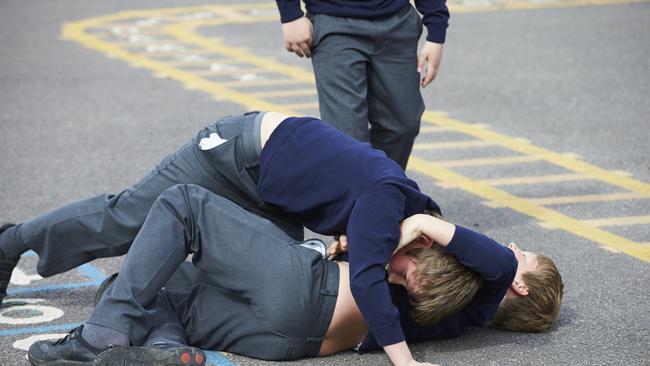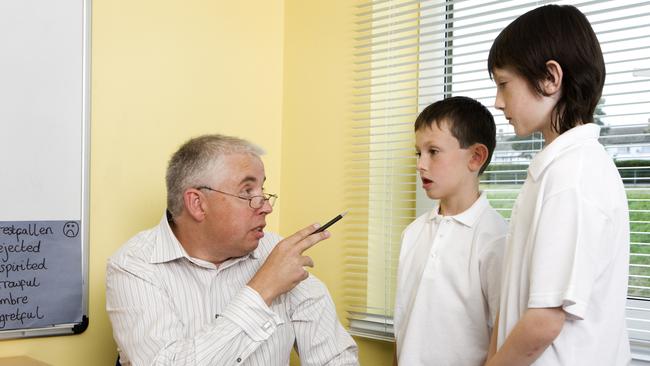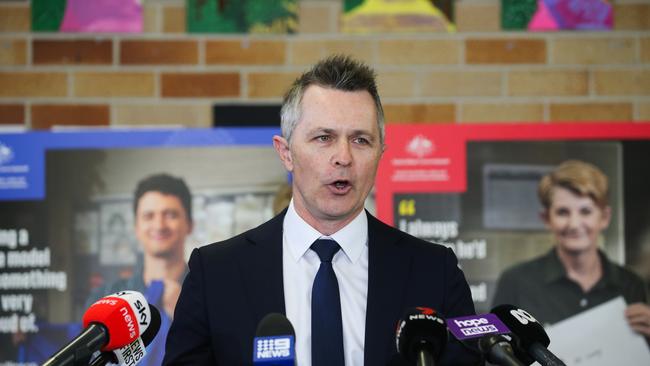Teachers told to ‘keep calm’, crack down on classroom behaviour
The first national guidelines for chaotic classroom management tells teachers to praise — not embarrass students — among other rules.

Teachers will be told to “keep calm’’ to control chaotic classrooms, under official behavioural guidelines that prioritise praise over punishment.
The first national guidelines for classroom management, issued on Tuesday by the Australian Education Research Organisation, tells teachers not to embarrass students in front of their classmates.
Indigenous and neurodiverse students might require different rules and routines that are “culturally safe’’, the “engaged classrooms’’ guidelines state.
“While eye contact may be routinely expected by many teachers during learning interactions, avoidance of eye contact is a gesture of respect for many Aboriginal and Torres Strait Islander people,’’ they state.
“Neurodivergence among students can result in different presentations of what active listening looks like in a classroom setting.’’
The guidelines – issued just days after a Senate inquiry found teachers are being injured and sexually assaulted in violently chaotic classrooms – focus on praising good behaviour. Students behave and learn better when they feel “safe, understood and appreciated’’, they state. Teachers are told to notice the effort of students, “thanking them so they feel their effort was worth it’’.
“Teachers build connections with students when they demonstrate respect and trust, and have empathy for their needs,’’ the guidelines state.
“Students are often motivated by status and maintaining their dignity and, understandably, want to avoid being embarrassed in front of their peers.
“Whenever practical, teachers should give students a chance to change the direction of their behaviour without embarrassment.’’
Teachers should set three to six rules for a class – such as listening when the teacher is talking, treating everybody with kindness and raising a hand to ask a question.
“Some students, such as those impacted by trauma, may experience difficulty in adhering to rules they don’t understand or relate to, especially when it comes to regulating emotions, making plans or dealing with changes in the routines,’’ the guidelines state.
“Some students may need additional guidance, support and scaffolds to help them learn and follow rules.’’

The AERO document says the guide does not cover students carrying a weapon or attending class while drunk or drugged. But it gives advice on dealing with “low-level disruption’’, such as talking in class or becoming distracted.
It advises teachers to model good behaviour: “Use a calm tone and active listening, interact respectfully, and be organised and on time. Positively worded rules should be established, defined, displayed and explicitly taught from day one.
“Students cannot learn well in disorderly classrooms, where they don’t feel safe and supported, and where they are disengaged.’’
AERO advises teachers to greet students warmly and by name when they enter a classroom. “Demonstrate that you’re trustworthy, consistent and reliable over time.
“Teachers can get to know students through informal chats, which help to build trust.’’
Federal Education Minister Jason Clare said the guidelines would help teachers manage the classroom, “which is good for them and good for their students’’.
“When students are fully engaged in the classroom, they learn at their best and teachers have more time to teach,’’ he said.

The AERO guidelines, funded via a $3.5m federal government grant, tell teachers to set “high expectations’’ for student behaviour.
“(This) can lead to increased effort from the students,’’ they state.
“If a student isn’t completing a learning task because they say it’s too hard, instead of demanding its completion and outlining the consequences for noncompliance, teachers can discuss these concerns and provide the support needed so the student can complete it successfully.’’
AERO advises teachers to pick their battles, stating “tactical ignoring’’ of minor issues, combined with praise for good behaviour, can encourage better behaviour.
When a student becomes angry or upset, it says, teachers should “acknowledge the emotion being expressed, speak quietly and calmly and show sincere concern’’.
“Unless unsafe, provide students with time to follow instructions and/or de-escalate.’’
AERO chief executive Jenny Donovan said students thrive in classrooms where they feel safe, can learn without distraction, and know what is expected of them.


To join the conversation, please log in. Don't have an account? Register
Join the conversation, you are commenting as Logout